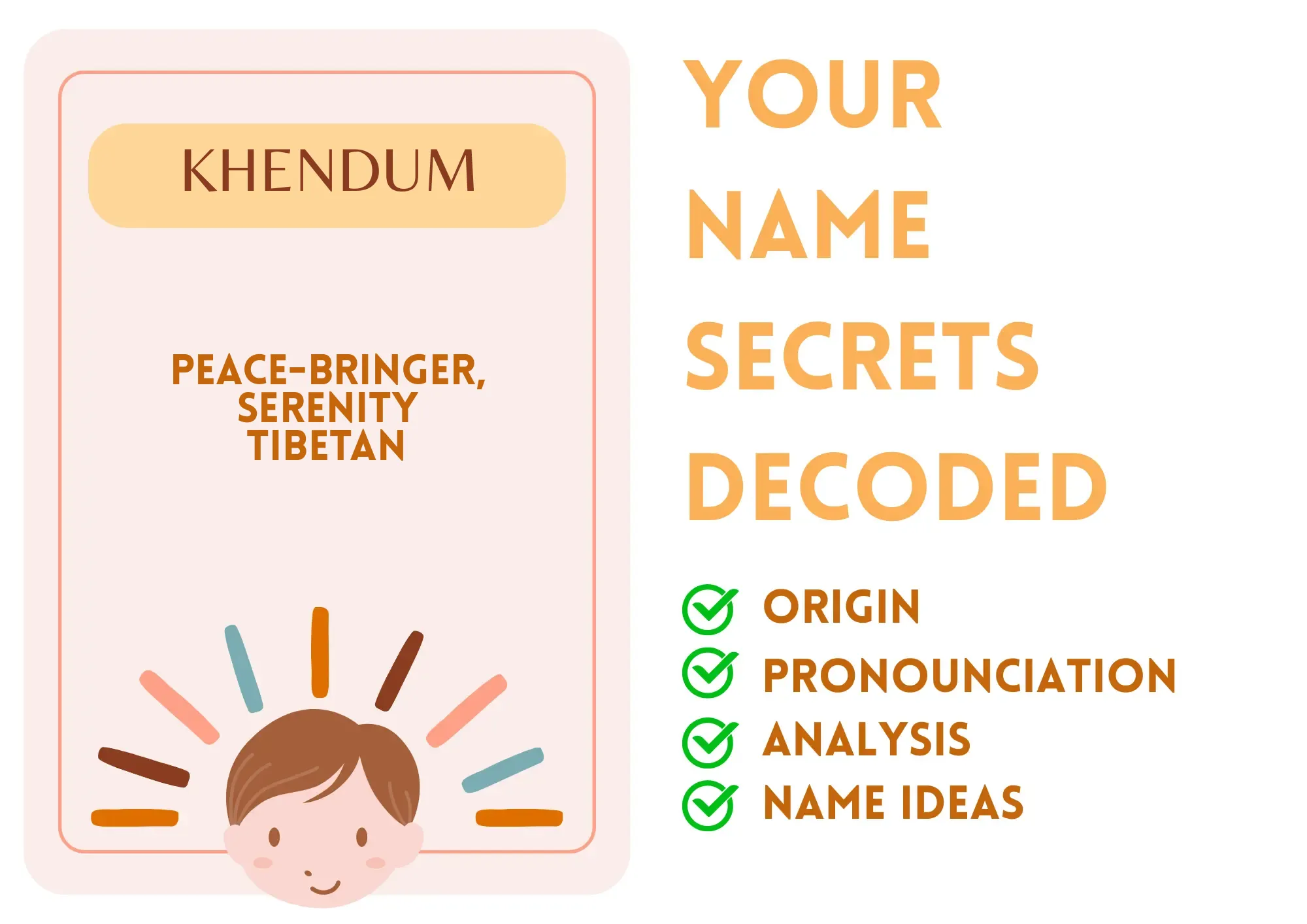
Khendum
Khendum is a unique name that has roots in the Tibetan culture and language. While the exact meaning of the name is not widely documented, it is often interpreted as 'the one who brings peace' or relates to 'serenity'. The name is used primarily for males and is part of a rich tradition that emphasizes harmony and balance.
Khendum resonates strongly within Tibetan Buddhism, as peace and tranquility are core themes in its teachings. Hence, it carries significant cultural and spiritual importance among Tibetan communities.
People with this name are often perceived as calm and balanced, embodying the serene qualities that the name represents. It is relatively easy to pronounce and write, although some may find the spelling unusual.
Common nicknames include Khem and Dum, while similar sounding names such as Khem and Kim are also worth considering. Sibling names such as Tashi (meaning auspicious) for a brother and Pema (meaning lotus) for a sister align well with the harmonious meanings associated with Khendum.
Basic Information
Gender: Boy
Sounds Like: KHEM-dum
Pronunciation Explanation: The first syllable 'KHEM' is pronounced with a hard 'k' sound, resembling 'khem' as in 'them', while the second syllable 'dum' rhymes with 'gum'. The emphasis is on the first syllable.
Summary and Meaning
Meaning: peace-bringer, serenity (Tibetan)
Origin: The name Khendum has Tibetan origins, drawing from themes that are significant in Tibetan culture and Buddhism.
Usage: Khendum is traditionally a masculine name, though it may be used more broadly.
Name Number (Chaldean)
Name Number (Pythagorean)
Popularity (Global Rank)
Overall: 1013025
Boys:
Most Popular in
Religious and Cultural Significance
Religion: Buddhism
Background: In Tibetan culture, Khendum holds a deep connection to Buddhism, an integral aspect of their spiritual and daily life. The significance of bringing peace is highly regarded in Buddhist teachings.
Cultural Significance: Khendum is appreciated in Tibetan culture for its association with tranquility and balance, reflecting the peaceful nature promoted in Buddhist philosophies.
Historical Significance: Khendum is not tied to a specific historical figure but rather embodies the teachings and principles of peace found within Tibetan Buddhist texts and traditions.
Popular Culture
Literature and Mythology: While Khendum may not feature prominently in global literature, names with similar meanings or sounds are found in Tibetan folklore and religious narratives, often embodying ideals of peace.
Movies and Television: The character Khendum may not appear directly in popular films but would resonate with characters embodying peace or wisdom found in films depicting Tibetan culture or Buddhism.
Feelings and Perceptions
Perception: Khendum is generally perceived positively; it evokes feelings of calmness and spiritual depth. The sound of the name feels unique and profound, contributing to its appeal.
Positive Feelings: Serene, unique, peaceful, harmonious, spiritual.
Negative Feelings: Some may find it difficult to spell or pronounce initially due to its uniqueness.
Practical Considerations
Ease of Writing and Calling: Khendum can be moderately easy to write and pronounce, consisting of seven letters and two syllables, though its uniqueness may require repetition for clarity.
Common Typos and Misspellings: Khendam,Khandum,Kendrum,Kendham
Common Nicknames: Khem,Dum
Khendum Popularity
Khendum Usage and Popularity By Country
| Country | Rank (Overall) |
|---|---|
| Bhutan | 1811 |
| United States | 344452 |
Khendum Usage and Popularity By City
| City | Rank (Overall) |
|---|
Compatibility Analysis
Famous Persons Named Khendum
No results found for Khendum.
Related Names
Similar Sounding Names:
Khem,Kenzo,Kimo,Kendall